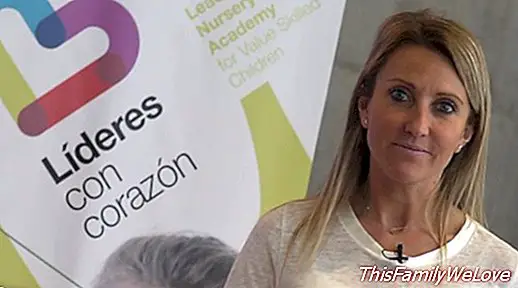The education of emotions, fashion or need?
Many researchers agree that the Emotional education it becomes more and more necessary if we want to achieve competences such as wellbeing, leadership, teamwork, social and family balance, initiative, adaptation to change, etc. The benefits of educate children on emotional intelligence They are multiple, and the sooner we start to educate the emotions, the better.
"It is never a question of denying unpleasant or negative emotions, but, rather, managing them," says Nélida Pérez, a doctor in Psychopedagogy and director of the Emotions Workshop of the Ceu Montepríncipe School. He adds that "as expressed by Martin Seligman (2010), father of positive psychology, it is necessary to educate children to develop strengths and virtues, which will help them live a life of well-being and happiness".
There are many possibilities we have to educate emotions, and the first point is "to have them present, through games, stories, movies, experiences with our children, and always trying to express our satisfaction and gratitude, for example: "Today I feel happy for ..." And also learn from conflicts, of frustrations, of situations that generate unpleasant emotions, because of them, we also learn. Accepting, understanding and regulating is the true emotional education. Techniques such as breathing, to recover calm, cognitive restructuring, change a limiting thought by an enhancer, relaxation, visualization ... etc. they are strategies that help us in this task and that we already implemented in the Braini Emotions Method from 3 years of age. It is therefore a reality already in the classroom, a reality to which we all have to add if we want a world with greater well-being, "says Dr. Nélida Pérez.

Academic performance and emotional intelligence
If we do a little history, Plato already said that "the emotional disposition of the student determines his ability to learn." Emotions can lead to failure or success, it will depend on how we use them. Descartes, separated the human being in reason of emotion. And, current neurology, with Damasio, with his research and publications, informs us of the importance of the bidirectional relationship between reason and emotion, as well as between body and mind.
Emotions are present in our day to day, influencing our thinking, our words, our behaviors. Thus, it is obvious that they influence the academic performance of our students.
"If I feel in a safe, free, respected, loved space ... there is no doubt that we will favor the cognitive capacity, motivation, creativity, and attention of our students, do not you believe? Educating emotional intelligence is and should be a cornerstone in current education, in order to promote and serve to educate the child in an integral way, to be able to live in the current society and improve it Obviously, all learning responds to an intentionality, that is why, the intention of families and teachers, should be to promote the emotional intelligence of children, and for this we have to be an example, model and means for it, "says Dr. Nélida Pérez.
At what ages should emotional intelligence work?
From always, that is to say, from the gestation, trying to feel good, so that the fetus perceives it. And already, from birth we began to develop the emotional intelligence of our baby, its structures, connections, through the experiences and experiences that we provide, through the affective bond.
The Emotional development is the process by which the child creates his identity, his self-esteem, his confidence in himself and in the world around him. Through interactions and bonding with parents, the baby begins this development in its early years, until it reaches the stage in which it already has an emotional awareness of itself, perception of himself as an individual and begins to form his own identity. And together with the explosion of vocabulary, he is already able to distinguish some of the emotions, identify and express them.
Dr. Nélida Pérez comments that "as she grows up, in her infantile stage, we will be able to equip her with regulation strategies and help her understand her emotions." That is why we have been teaching emotional intelligence since the earliest age, although it is important to emphasize, It's never too late to start, as the experts say, this intelligence is learned. "
Marisol Nuevo Espín




